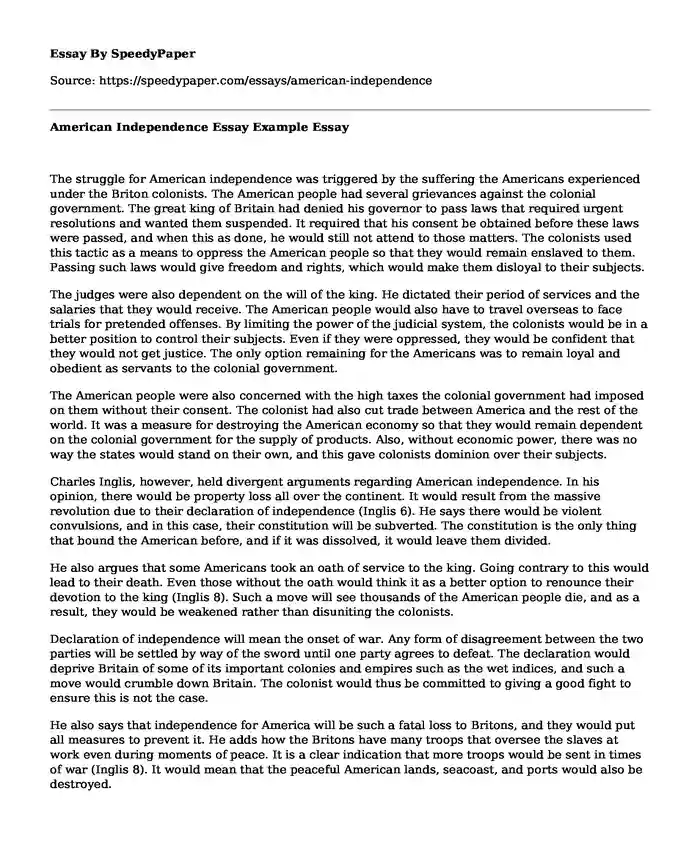
| Type of paper: | Essay |
| Categories: | Independence American history |
| Pages: | 3 |
| Wordcount: | 740 words |
The struggle for American independence was triggered by the suffering the Americans experienced under the Briton colonists. The American people had several grievances against the colonial government. The great king of Britain had denied his governor to pass laws that required urgent resolutions and wanted them suspended. It required that his consent be obtained before these laws were passed, and when this as done, he would still not attend to those matters. The colonists used this tactic as a means to oppress the American people so that they would remain enslaved to them. Passing such laws would give freedom and rights, which would make them disloyal to their subjects.
The judges were also dependent on the will of the king. He dictated their period of services and the salaries that they would receive. The American people would also have to travel overseas to face trials for pretended offenses. By limiting the power of the judicial system, the colonists would be in a better position to control their subjects. Even if they were oppressed, they would be confident that they would not get justice. The only option remaining for the Americans was to remain loyal and obedient as servants to the colonial government.
The American people were also concerned with the high taxes the colonial government had imposed on them without their consent. The colonist had also cut trade between America and the rest of the world. It was a measure for destroying the American economy so that they would remain dependent on the colonial government for the supply of products. Also, without economic power, there was no way the states would stand on their own, and this gave colonists dominion over their subjects.
Charles Inglis, however, held divergent arguments regarding American independence. In his opinion, there would be property loss all over the continent. It would result from the massive revolution due to their declaration of independence (Inglis 6). He says there would be violent convulsions, and in this case, their constitution will be subverted. The constitution is the only thing that bound the American before, and if it was dissolved, it would leave them divided.
He also argues that some Americans took an oath of service to the king. Going contrary to this would lead to their death. Even those without the oath would think it as a better option to renounce their devotion to the king (Inglis 8). Such a move will see thousands of the American people die, and as a result, they would be weakened rather than disuniting the colonists.
Declaration of independence will mean the onset of war. Any form of disagreement between the two parties will be settled by way of the sword until one party agrees to defeat. The declaration would deprive Britain of some of its important colonies and empires such as the wet indices, and such a move would crumble down Britain. The colonist would thus be committed to giving a good fight to ensure this is not the case.
He also says that independence for America will be such a fatal loss to Britons, and they would put all measures to prevent it. He adds how the Britons have many troops that oversee the slaves at work even during moments of peace. It is a clear indication that more troops would be sent in times of war (Inglis 8). It would mean that the peaceful American lands, seacoast, and ports would also be destroyed.
Finally, he says that if they manage to win the war, then they would have a weak legislature, which is guided by the British way of ruling (Congress 1776). The Americans had adopted most habits from the Britons, and oppression of the weak would continue even after the colonist left.
I would have adopted for independence. The colonist had caused many grievances for their subjects. Despite the suffering that the Americans faced, they were also enslaved and denied their freedom and rights. Nothing feels more oppressive like slavery, especially considering that nature human equal opportunities, and in this case, every human life deserves to be respected.
Work cited
Inglis, Charles. The True Interest of America Impartially Stated, in Certain Strictures on a Pamphlet Intitled Common Sense: By an American.[Ten Lines of Quotations]. Vol. 3. James Humphreys, Junr. The corner of Black Horse Alley Front-Street, 1776. 1-10
Congress, Continental. "The unanimous declaration of the thirteen United States of America." The Library of Congress: American Memory. http://memory. loc. gov/cgibin/query/r. 1776.
Cite this page
American Independence Essay Example. (2022, Feb 23). Retrieved from https://speedypaper.com/essays/american-independence
Request Removal
If you are the original author of this essay and no longer wish to have it published on the SpeedyPaper website, please click below to request its removal:
- Causes of Drug Addiction, Free Essay Sample
- Research Writing Experience - Free Essay Sample
- The Future Impact of Tobacco Use, Essay Sample for Your Inspiration
- Free Paper: CV Example of a Public Relations Manager
- Free Essay Analyzing the Pepsi Commercial Ad with Kendall Jenner in It
- Illegal Aliens and crime
- Essay Sample on Our Desire to Communicate With Our Machines
Popular categories




